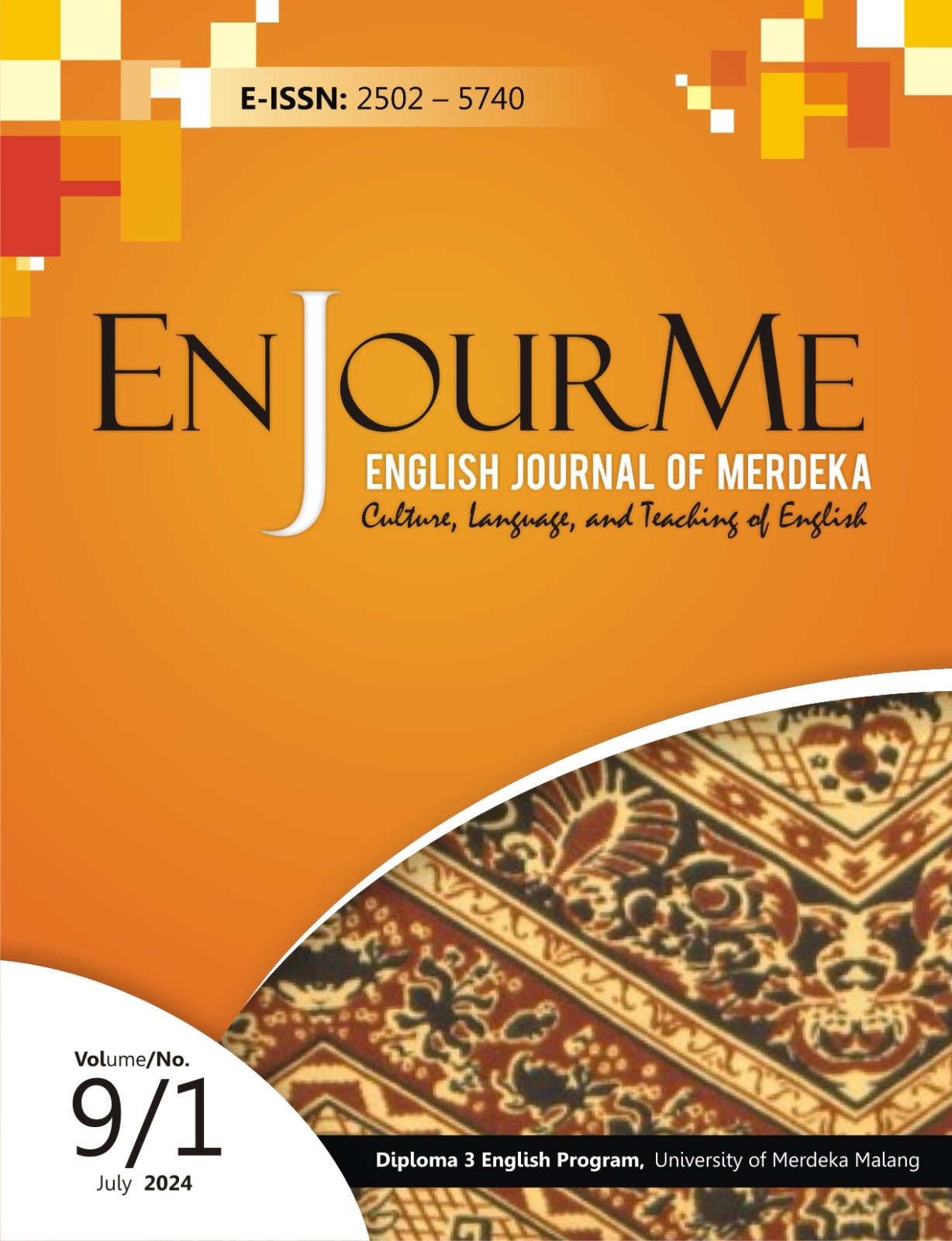Psychosexual fixation and sexual deviance: The impact of parental abandonment in Haruki Murakami's Kafka on the Shore
DOI:
https://doi.org/10.26905/enjourme.v9i1.13473Keywords:
Parental abandonment, psychoanalysis, psychosexual development, sexual deviance, unconscious mindAbstract
The development of psychosexual stages in children significantly influences their behavior. There are five stages: oral, anal, phallic, latent, and genital. Disruptions or fixations during any stage can impact societal conduct and relationships. In Kafka on the Shore, parental abandonment causes fixation in one of these stages, as seen in the main character, Kafka Tamura. This disrupted bond leads to repressed emotions and unfulfilled desires manifesting as sexual deviance. Therefore, this study aims to describe the development of sexual deviance due to traumatic parental abandonment in Haruki Murakami’s Kafka on the Shore, using a descriptive qualitative method and analyzed through Sigmund Freud’s psychoanalytic theory. It affirms that neglectful parental figures can significantly impact a child's psychological development.
Downloads
References
Anderson, B. (2019). Last refuge: The escape from violence in Kafka on the Shore. The writing anthology, 16-23. https://central.edu/writing-anthology/2019/05/02/last-refuge-the-escape-from-violence-in-kafka-on-the-shore/
Birkerts, S. (1996). Literature: the evolving canon. Allyn and Bacon.
Bowlby, J. (n.d.). Separation: Anxiety and anger. Basic Books.
Bowlby, J. (2000). Attachment and loss. Penguin Random House.
Brumariu, L. E., & Kerns, K. A. (2010). Parent–child attachment and internalizing symptoms in childhood and adolescence: A review of empirical findings and future directions. Development and Psychopathology, 22(1), 177–203. https://doi.org/10.1017/S0954579409990344
Carson, D. K. (2013). Child abandonment: The abandoned expression of abuse and neglect. Early Child Development and Care, 27(1), 1-18. https://doi.org/10.1080/03004430.1987.10721177
Creswell, J. W., & Creswell, J. D. (2017). Research design: Qualitative, quantitative, and mixed methods approaches. SAGE Publications.
Creswell, J. W., & Miller, D. L. (2000). Determining validity in qualitative inquiry. Theory Into Practice, 39(3), 124-130. https://doi.org/10.1207/s15430421tip3903_2
De Souza, C. (2022). From collective amnesia to shared responsibility: Bridging trauma in Haruki Murakami’s Kafka on the Shore. Pivot: A Journal of Interdisciplinary Studies and Thought, 8(1). https://doi.org/10.25071/2369-7326.40328
Dwipuspita, W., & Wediyantoro, P. (2023). Translation strategies in Shakespeare's Romeo and Juliet translated drama script viewed from the romance perspective. EnJourMe (English Journal of Merdeka) : Culture, Language, and Teaching of English, 8(2), 130–138. doi:https://doi.org/10.26905/enjourme.v8i2.10950
Elkatawneh, H. (2013). Freud’s psycho-sexual stages of development. United States, Minneapolis: Walden Universily. http://dx.doi.org/10.2139/ssrn.2364215
Flutsch, M. (2006). Girls and the unconscious in Murakami Haruki's Kafka on the Shore. Japanese Studies, 26(1), 69-79. https://doi.org/10.1080/10371390600636240
Fouche, P., & Holz, T. (2015). Roald Dahl: A psychosexual developmental trajectory study illustrated within psychobiography. Journal of Psychology in Africa, 25(5), 403-413. https://doi.org/10.1080/14330237.2015.1101262
Freud, S. (1973). Introductory lectures on psychoanalysis (A. Richards & J. Strachey, Eds.; J. Strachey, Trans.). Penguin Books.
Freud, S. (1975). Three essays on the theory of sexuality (J. Strachey, Ed.; J. Strachey, Trans.). Basic Books.
Freud, S. (2008). The interpretation of dreams (J. Crick & R. Robertson, Eds.; J. Crick, Trans.). OUP Oxford.
Gagnon, J. H., & Simon, W. (1968). Sexual deviance in contemporary America. The ANNALS of the American Academy of Political and Social Science, 376(1), 106-122. https://doi.org/10.1177/000271626837600111
Kim, J. P. S. (2022). Rethinking Haruki Murakami: An alternative history of traumas and aftermaths in Kafka on the Shore. Critique: Studies in Contemporary Fiction, 64(3), 416–429. https://doi.org/10.1080/00111619.2022.2041539
Lekshmi, D., & Soubhagya, S. (2020). Deciphering trauma and its excruciating experiences: An analysis of Haruki Murakami’s Kafka on the Shore. Journal of Xi'an University of Architecture & Technology, XII(IV), 4208-4215.
Maniglio, R. (2011, 07). The role of childhood trauma, psychological problems, and coping in the development of deviant sexual fantasies in sexual offenders. Clinical psychology review, 31(5), 748-756. https://doi.org/10.1016/j.cpr.2011.03.003
Nazir, M. (2013). Metode penelitian. (R. Sikumbang, Ed.; Cet. 8). Ghalia Indonesia. https://lib.ui.ac.id
Thakur, R., & Khurana, V. (2020). Privileging oddity and otherness: A study of Haruki Murakami’s Kafka on the Shore. Rupkatha Journal on Interdisciplinary Studies in Humanities, 12(5). https://dx.doi.org/10.21659/rupkatha.v12n5.rioc1s6n2
Tewksbury, R. (2015). Studying deviance: qualitative methods. The Handbook of Deviance, 210-224.
Waite, M. (Ed.). (2012). Paperback Oxford English dictionary. Oxford University Press, USA.
Wattanagun, K., & Chotiudompant, S. (2009). The quest and reconstruction of identity in Haruki Murakami’s Kafka on the Shore. Manusya: Journal of Humanities, 12(1), 26-39. https://doi.org/10.1163/26659077-01201003
Additional Files
Published
How to Cite
Issue
Section
License
Authors who publish with this journal agree to the following terms:
(1) Copyright of the published articles will be transferred to the journal as the publisher of the manuscripts. Therefore, the author confirms that the copyright has been managed by the journal.
(2) Publisher of EnJourMe (English Journal of Merdeka) : Culture, Language, and Teaching of English is University of Merdeka Malang.
(3) The copyright follows Creative Commons Attribution–ShareAlike License (CC BY SA): This license allows to Share — copy and redistribute the material in any medium or format, Adapt — remix, transform, and build upon the material, for any purpose, even commercially.




